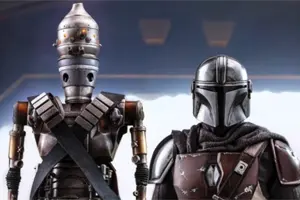TV let The Mandalorian take risks and slow things down, which The Rise of Skywalker couldn't do
-

"TV is looking more and more like the place where the franchise will play out in the future," says Marissa Martinelli of the future of Star Wars, pointing to the return of The Clone Wars, upcoming Disney+ series on Obi-Wan Kenobi and Cassian Andor and the rousing Season 1 success of The Mandalorian. While The Rise of the Skywalker film felt overstuffed, The Mandalorian was able to do something different because it was afforded the leisurely pace of a TV series. "The Mandalorian finale opens with nearly three minutes of stormtroopers just … hanging out," says Martinelli. "Not important stormtroopers with secret backstories or hidden powers, mind you. Just a couple of bored, faceless nobodies (with the voices of Jason Sudeikis and Adam Pally) chatting about the downsides of working for an organization where commanders regularly shoot their own men and showing off that famously terrible stormtrooper aim. If not for one of the scouts periodically smacking a certain alien baby concealed in his bag, you’d think you were watching a Saturday Night Live sketch. What an unthinkable luxury those three minutes are, coming as they do on the heels of The Rise of Skywalker, a movie that in two and a half hours never pauses to take a breath. To the untrained eye, The Mandalorian and The Rise of Skywalker aren’t all that different, both offering plenty of silly new Star Wars jargon, a mercenary who won’t remove their helmet, side errands to various planets, a droid who sacrifices himself for the greater good, and a powerful Force user with a mysterious past. But where The Rise of Skywalker was overstuffed and underexplained, The Mandalorian took its sweet time, and not just by stretching its story out over eight episodes (with more to come) or by releasing them once a week rather than in a bingeable bundle. The very quality that turned some critics off of The Mandalorian’s early episodes, its leisurely pace, has turned out to be the series’ saving grace, letting fans marinate for a while in this universe of bounty hunters and space wizards rather than hurling them through it at light speed."
ALSO:
- The Mandalorian found success by using pre-existing Star Wars lore to create something new yet also well-worn: "In one respect, The Mandalorian is a curiously cautious enterprise in the way it approaches its characters," says Graeme McMillan. "Every one of the primary characters in the show — with the exception of Cara Dune and Greef Karga — is purposely designed to visually resemble pre-existing characters with in-built fan bases from the original trilogy of Star Wars movies, but the show, equally purposefully, refuses to use the original characters being visually echoed. It’s a way to take advantage of audience nostalgia without risking anything — if fans don’t like the treatment of IG-11, so what? It’s not actually IG-88 from The Empire Strikes Back. If they’re not into the Mandalorian himself, at least it’s not the memory of Boba Fett that’s being disgraced. For those involved in the show, it’s a win-win proposition: all the benefit of that “Hey, I had that action figure!” with all of the plausible deniability required against accusations of ruining someone’s childhood."
- The season finale showed the power of having an unimpeachable season finale: "The Mandalorian’s parting shot is as much a corrective to its own weak points as those of its expanded universe," says Alison Herman. "The show went out on a high note by backing away from its extremes, providing at the eleventh hour much of what the prior stretch had been conspicuously missing. The effect is even retroactive. Baby Yoda–induced awe aside, I would not previously have called The Mandalorian an emotional experience. Now, the character has an arc—and a name!—as well as a title."
- The Mandalorian shows that there are different genres within Star Wars worth exploring: "It’s so simple yet so satisfying: exploring new genres through the lens of Star Wars opens up a universe of story possibilities," says Chelsea Steiner. "This is an especially promising development in light of trilogy fatigue, and the overly repetitive themes of TROS. After nine films, many fans want stories that deviate from the well worn themes of legacy, parenthood, and light vs. dark. And it’s not just the stories themselves, but the tone of these new entries."
- How Disney learned from Marvel's past TV mistakes to make The Mandalorian an instant hit
- Disney's Bob Iger says Star Wars TV shows could become films
- The Mandalorian and The Witcher mirror each other: Both revolve around violent freelances who accidentally becoming adoptive dads
- Several established Star Wars characters from the Skywalker saga could appear in Season 2
- The Mandalorian viewers are still ticked off at Jason Sudeikis
- Baby Yoda being 50 years old doesn't make sense when you look at how other animals age
- Disneyland and Disney World have begun offering a Baby Yoda cocktail
- Check out The Mandalorian's Funko Pop dolls
- Ranking Baby Yoda's scene partners: Mando is No. 2
TOPICS: Star Wars: The Mandalorian, Disney+, The Witcher, Jason Sudeikis, Disney, Marketing, Star Wars
